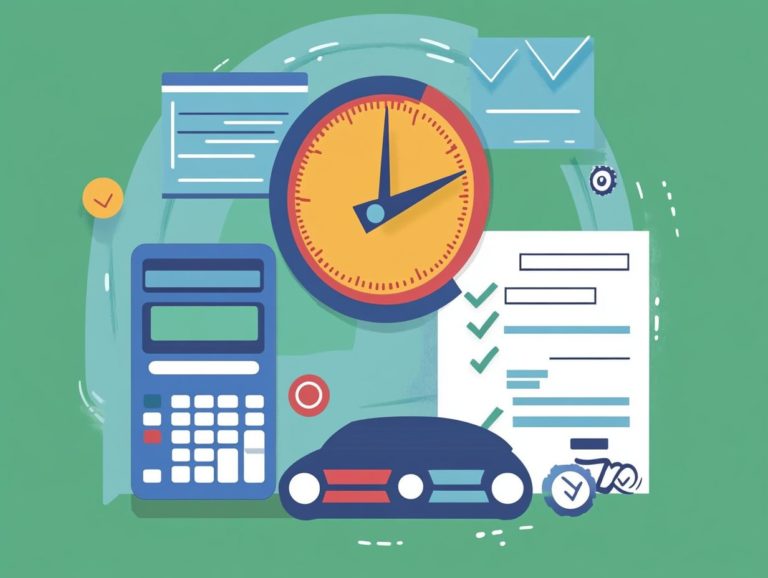How to Calculate Your Monthly Car Payment
Navigating the world of car payments can feel overwhelming, especially for first-time buyers like you.
It s important to understand what a car payment is and the factors that influence it. This guide will simplify car payments, covering key calculations and important factors like interest rates and down payments.
You will also find practical tips for managing your payments and preparing for unexpected expenses.
Are you ready to take the wheel?
Contents
- Key Takeaways:
- Understanding Car Payments
- Calculating Your Monthly Car Payment
- Factors to Consider Before Taking Out a Car Loan
- Tips for Managing Your Car Payments
- FAQs
- How do I calculate my monthly car payment?
- What is the formula for calculating my monthly car payment?
- Can I use a car loan calculator to determine my monthly payment?
- What is the recommended percentage of income to spend on a car payment?
- What factors can affect my monthly car payment?
- Is it possible to lower my monthly car payment?
Key Takeaways:

- Car payments are regular installments towards the purchase of a car. They include the vehicle’s price, interest rates, and loan terms.
- The formula for calculating car payments is: (car price + interest) / loan term in months. A larger down payment or trade-in value can lower your total cost.
- Create a budget and stick to strategies for managing payments. Set aside funds for repairs and maintenance to prepare for unexpected expenses.
Understanding Car Payments
Understanding car payments is crucial if you re considering financing a vehicle, whether new or used.
This process involves various factors, such as the auto loan amount, your monthly payment, interest rate, and credit score.
What is a Car Payment?
A car payment is the monthly sum you pay towards your auto loan. It typically includes the principal (the original amount you borrowed) and the interest (the cost of borrowing that sum).
This payment can change based on several key factors. The principal amount affects your monthly payment, while the interest reflects your borrowing cost.
A larger loan generally means higher monthly payments, especially with a steep interest rate. The financing terms, such as the duration of the loan, also influence your payment schedule.
Factors that Affect Car Payments
Several factors significantly influence your monthly car payments. These include your credit score, the interest rate, the length of the loan term, and the size of your down payment or trade-in value.
A higher credit score usually leads to better interest rates, reducing your monthly payments. A shorter loan term may result in higher payments but can save you money on interest over time.
A larger down payment reduces the loan amount, lowering your monthly obligations. Your trade-in value can also boost your purchasing power.
Calculating Your Monthly Car Payment
Calculating your monthly car payment involves understanding essential variables like the loan amount, interest rate, and loan term. To simplify this process, you can learn how to use an online car loan calculator.
You can easily determine these figures using an auto loan calculator or a payment calculator to streamline the process and ensure accuracy.
Let s get started on your journey to owning a car!
Formula for Calculating Car Payments

The formula for calculating your monthly car payment is captured in the equation M = P[r(1+r)^n] / [(1+r)^n 1]. Here, M stands for your monthly payment, P represents the loan amount, r is the monthly interest rate, and n signifies the total number of payments or the loan term in months.
To truly understand this equation, it s beneficial to dissect each element. The principal amount, called P, is the initial sum you borrow. The interest rate, r, requires a bit of conversion; simply divide the annual rate by 12 to obtain the monthly figure.
The total number of payments, n, reflects the loan duration in months think 60 months for a five-year loan. For example, if you re financing a car worth $20,000 at an interest rate of 5%, your monthly interest rate would come out to be 0.00417.
By inserting these values into the formula, you can calculate your monthly payments. Adjustments to either the loan amount or interest rate can significantly influence your overall affordability.
Example Calculation
Consider this scenario: you re looking at an auto loan of $20,000 with an interest rate of 5% over a term of 60 months. To find out your monthly payment, you d utilize a straightforward formula to determine that figure.
First, clarify the key parameters. The total loan amount is $20,000, and with an annual interest rate of 5%, this translates to a monthly interest rate of roughly 0.4167% (that s 5% divided by 12 months).
Now, applying the monthly payment formula expressed as P = [r*PV] / [1 – (1 + r)^-n], where P denotes your monthly payment, r is the monthly interest rate, PV represents the loan amount, and n indicates the total number of payments will illustrate how extending your loan term to 72 months can lower your monthly payments, but may increase the total interest you pay over the life of the loan.
If you decide to shorten the term, you may face higher monthly payments, but this choice could lead to significant savings in interest overall.
Factors to Consider Before Taking Out a Car Loan
Ready to drive off with your dream car? Before you grab that loan, let s explore some important factors! It’s crucial to weigh several key elements such as interest rates, loan terms, down payment amounts, and the trade-in value of your current vehicle.
Don t overlook interest rates they can make or break your budget! Each of these elements can significantly impact the total interest you’ll pay throughout the life of the loan.
Interest Rates and Loan Terms
Interest rates are a crucial factor in determining the cost of your auto loan. The length of the loan can significantly influence your monthly payments and overall expenses.
When you choose a longer loan term, you might enjoy lower monthly payments since the principal is spread out over more months. However, keep in mind that this could result in paying more interest over the life of the loan.
On the flip side, opting for a shorter term may lead to higher monthly payments, but it can ultimately save you money in the long run.
To secure better rates, consider boosting your credit score and exploring offers from multiple lenders. Evaluating different financing options is essential, as it gives you the power to discover the most favorable terms that align with your budget and financial aspirations.
Down Payment and Trade-in Value
The size of your down payment and the trade-in value of your current vehicle can play a pivotal role in reducing the loan amount for your auto loan. This ultimately influences your monthly payments and the total cost of your vehicle.
When you make a larger cash payment upfront, you not only lower the principal amount financed but also reduce the interest that accumulates over the life of the loan. This strategic decision can lead to significant long-term savings; even a few extra thousand dollars can shift the financial balance in your favor.
A well-evaluated trade-in can further enhance the valuation of your new vehicle, allowing for additional reductions in financing costs. By carefully considering these factors, you can secure a more manageable monthly payment, paving a smoother path to vehicle ownership without unnecessary financial strain.
Tips for Managing Your Car Payments

Effectively managing your car payments requires a thoughtful approach to budgeting and the implementation of payment strategies designed to minimize interest costs. It s wise to prepare for unexpected expenses that could arise over the course of your loan.
Taking these steps ensures you remain in control of your financial commitments and can navigate any surprises with confidence.
Budgeting and Payment Strategies
Want to take charge of your finances? Let s dive into effective budgeting strategies!
Establishing a solid budgeting plan and effective payment strategies give you the power to stay ahead of your monthly obligations. This ensures your cash flow remains robust without sacrificing your savings.
By embracing techniques like the envelope method or zero-based budgeting (allocating every dollar to specific expenses), you can allocate funds specifically for your car expenses. This makes it easy to track your spending.
Using budgeting apps offers valuable insights into your spending habits, helping you identify areas ripe for cuts. This way, you can redirect more surplus toward your car payments.
Choosing bi-weekly payment plans over traditional monthly payments can significantly reduce your overall interest costs. It can also accelerate the loan payoff timeline. Staying informed about potential refinancing opportunities is equally vital, as it can lead to lower rates and bolster your long-term financial stability.
Dealing with Unexpected Expenses
Unexpected expenses can emerge at any moment. This is why having a well-structured financial plan, complete with an emergency fund, is crucial. It shields you from the risk of slipping behind on car payments and missing out on valuable interest savings.
By proactively anticipating potential financial challenges, you can sidestep the stress that surprise costs often bring. Regularly assessing and adjusting your budget is essential, ensuring that you allocate funds specifically for emergencies.
Enhancing this financial cushion not only protects you from unforeseen mishaps but also preserves your ability to make consistent payments, such as for your car. Mastering the art of efficient savings allocation can lead to more favorable interest rates on loans and credit.
Employing strategies like reviewing your monthly expenses or automating your savings can significantly aid in building that vital financial buffer. This sets the stage for long-term stability.
Watch this video to learn simple tips to manage your car payments effectively!
FAQs
How do I calculate my monthly car payment?
To calculate your monthly car payment, you will need to know the total cost of the car, the interest rate, and the length of the loan. Once you have this information, you can use a car loan calculator or follow a simple formula to determine your monthly payment.
What is the formula for calculating my monthly car payment?

The formula for calculating your monthly car payment is: A = P * (r(1+r)^n)/((1+r)^n – 1), where A is the monthly payment, P is the principal amount (total cost of the car), r is the monthly interest rate, and n is the number of months in the loan period.
Can I use a car loan calculator to determine my monthly payment?
Yes, there are many car loan calculators available online that can help you determine your monthly car payment. All you need to do is input the necessary information, and the calculator will do the math for you.
What is the recommended percentage of income to spend on a car payment?
Financial experts recommend spending no more than 10-15% of your monthly income on car payments. This ensures that you can comfortably afford your car without putting a strain on your finances.
What factors can affect my monthly car payment?
Several factors can affect your monthly car payment, including the total cost of the car, the interest rate, the length of the loan, and any additional fees or taxes. Your credit score and down payment amount can also impact your monthly payment.
Is it possible to lower my monthly car payment?
Yes, there are a few ways to lower your monthly car payment. You can negotiate a lower interest rate, choose a longer loan term, or make a larger down payment. You can also consider buying a used car or opting for a more affordable model.
Have more questions? Don t hesitate to reach out!






